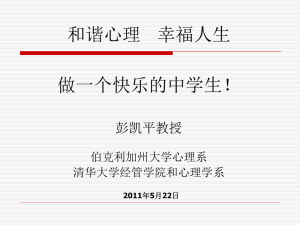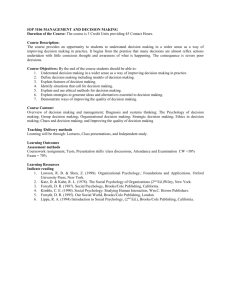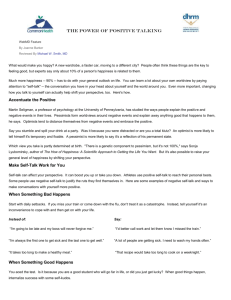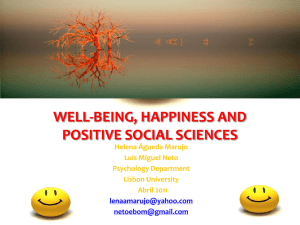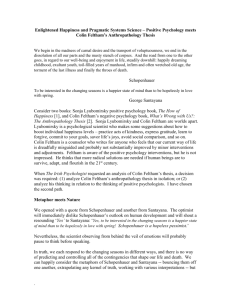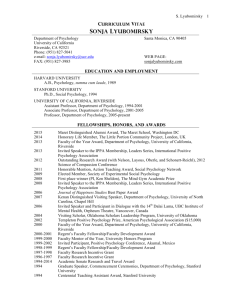Handout 2 - Minnesota School Psychologists Association
advertisement
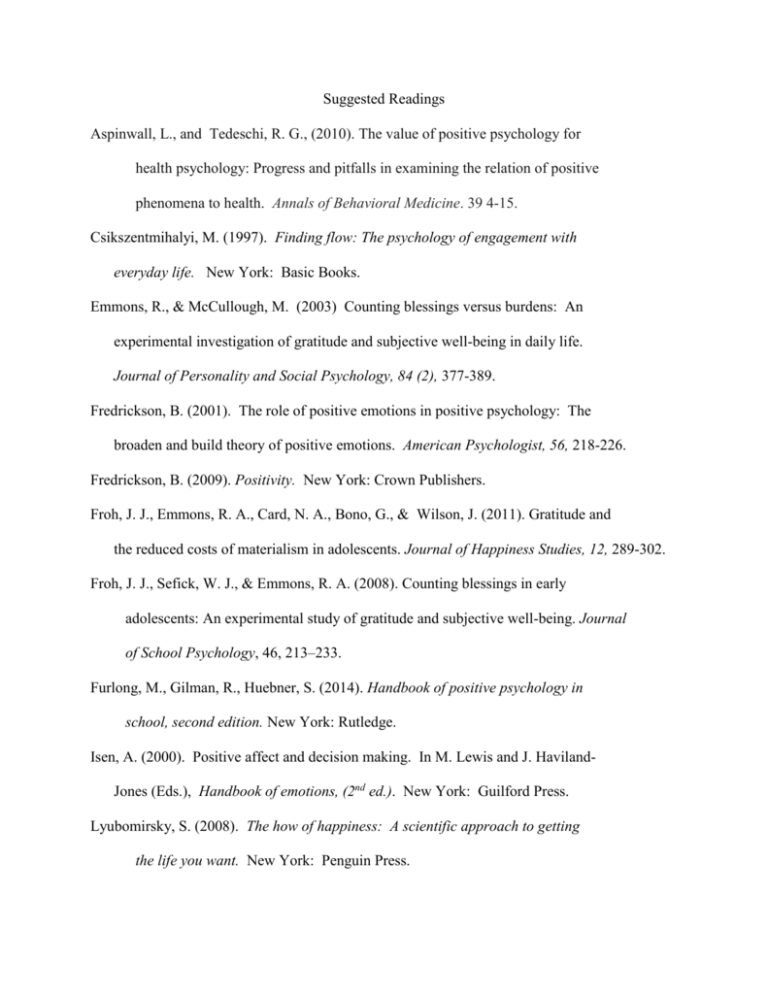
Suggested Readings Aspinwall, L., and Tedeschi, R. G., (2010). The value of positive psychology for health psychology: Progress and pitfalls in examining the relation of positive phenomena to health. Annals of Behavioral Medicine. 39 4-15. Csikszentmihalyi, M. (1997). Finding flow: The psychology of engagement with everyday life. New York: Basic Books. Emmons, R., & McCullough, M. (2003) Counting blessings versus burdens: An experimental investigation of gratitude and subjective well-being in daily life. Journal of Personality and Social Psychology, 84 (2), 377-389. Fredrickson, B. (2001). The role of positive emotions in positive psychology: The broaden and build theory of positive emotions. American Psychologist, 56, 218-226. Fredrickson, B. (2009). Positivity. New York: Crown Publishers. Froh, J. J., Emmons, R. A., Card, N. A., Bono, G., & Wilson, J. (2011). Gratitude and the reduced costs of materialism in adolescents. Journal of Happiness Studies, 12, 289-302. Froh, J. J., Sefick, W. J., & Emmons, R. A. (2008). Counting blessings in early adolescents: An experimental study of gratitude and subjective well-being. Journal of School Psychology, 46, 213–233. Furlong, M., Gilman, R., Huebner, S. (2014). Handbook of positive psychology in school, second edition. New York: Rutledge. Isen, A. (2000). Positive affect and decision making. In M. Lewis and J. HavilandJones (Eds.), Handbook of emotions, (2nd ed.). New York: Guilford Press. Lyubomirsky, S. (2008). The how of happiness: A scientific approach to getting the life you want. New York: Penguin Press. Marques, S., & Lopez, S. Building hope in our children. NASP Communiqué, 30 (11). Molony, T., & Henwood, M. (2010 a). Gratitude works in schools. NASP Communiqué, 38 (6). Molony, T., & Henwood, M. (2010 b). School-based activities to develop optimism in children. NASP Communiqué, 38 (7). Molony, T., & Henwood, M (2010 c). Signature strengths in positive psychology. NASP Communiqué, 38, (8). Norem, J.K. (2001). The positive power of negative thinking. New York: Basics. Park, N., & Peterson, C. (2008). Positive psychology and character strengths: Application to strengths-based school counseling. Professional School Counseling, 12, 85-92. Peterson, C., & Seligman, M. (2004). Character strengths and virtues: A handbook and classification. Washington, DC: American Psychological Association. Seligman, M. (2002). Authentic happiness: Using the new positive psychology to realize your potential for lasting fulfillment. New York: Free Press. Seligman, M. (2011). Flourish: A visionary new understanding of happiness and well-being. New York: Free Press. Snyder, C. (1994). The psychology of hope. New York: Free Press. Snyder, C.R., Lopez, S., and Pedrotti, J.T. (2011). Positive Psychology: The scientific and practical explorations of human strengths, Second Edition. Thousand Oaks, CA: Sage Press. Weiner, B. (1986). An attributional theory of motivation and emotion. New York: Springer-Verlag. Positive Psychology Annotated Bibliography Barbara Fredrickson (PEPLab), University of North Carolina Positive Emotions and Psychophysiology Lab University of North Carolina, Chapel Hill: http://www.unc.edu/peplab/home.html Maintained by the University of North Carolina, Chapel Hill. This website provides information about the PEPlab which studies how positive emotions affect thinking patterns, social behaviors and psychological reactions, with information regarding The Broaden-and Build Theory of Positive Emotions, The Undoing Hypothesis and the Positivity Ratio. Sonja Lyubomirsky – University of California, Riverside www.faculty.ucr.edu/~sonja/ This website describes Lyubomirsky’s research regarding happiness and how and why can people learn to lead happier and more flourishing lives? This website provides links to an iPhone application: Live Happy. Additionally, there is a comprehensive list of Sonja Lyubomirsky’s books, papers & publications. Fishful Thinking Fishful Thinking: A resource for parenting positive kids. http://www.goldfishsmiles.com/ Parents interested in positive parenting through the development of optimism, resiliency, emotional awareness, empowerment and hope can obtain valuable information on this website maintained by Pepperidge Farms based on the work of Karen Reivich. This website provides an assortment of ideas and activities as well as a forum for questions. Martin Seligman, University of Pennsylvania- Authentic Happiness www.authentichappiness.sas.upenn.edu Rick Hanson- Psychologist and Senior Fellow at Berkley https://www.rickhanson.net/
